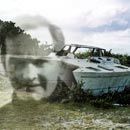A Terrifying True Fable That Will Make You Never Lie Again

Have you ever been forced to tell a dumb lie to get out of trouble and then piled on even more insane falsehoods until you were crushed under a Jenga tower of your own deception? Well, no matter how screwed up your life is, know that you're well-adjusted compared to the one-man Coen brothers movie who was Donald Crowhurst.

Warning: His story is more Fargo, less Raising Arizona.
In 1968, bored by all the free love and easy access to psychedelics, The Sunday Times of London promised the then-princely sum of 5,000 pounds to whoever sailed solo and nonstop around the world the quickest. Crowhurst, a weekend sailor and down-on-his-luck inventor, saw the prize as an opportunity to get out of debt. It didn't matter that his experimental trimaran, the Teignmouth Electron, wasn't designed to sail the open ocean -- Crowhurst planned to invent safety devices that would keep his boat from capsizing.

This is what eventually happens when you try to invent safety devices on the fly.
OK, so there wasn't time to finish building them before the race started, but that was no problem for Crowhurst -- he'd do it on the way. Well, at least he would have, if he hadn't left his tools and equipment on the docks. Also, if he failed to finish the race, his investors would claim his house and business as collateral. And did we mention that Crowhurst also hired a publicist to gin up his history-making voyage for the U.K. press?
So after a few laborious weeks at sea, Crowhurst's boat had sustained serious damage, which he had no way of repairing without basic tools. Stuck between financial ruin and certain death, Crowhurst chose a third option -- he would drift around the Atlantic (off the coast of South America) for five months and then sneak back into the race after the other sailors had reached the final stretch.

Crowhurst began reporting a completely fake journey, one in which he made record-breaking progress. When pressed for details, he sent out bizarre missives like "NOW EQUAL FOOTING MERMAIDS STOP." This charade took an enormous amount of upkeep. (He had the time, floating aimlessly in the Atlantic and whatnot.) He falsified star charts, weather reports, and sailing observations, all while bobbing hidden and out of radio contact, the endless ocean and a copy of Albert Einstein's Relativity: The Special and the General Theory slowly eroding his sanity. A predicament not unlike that of Doctor Manhattan.

"That hobo-haired old fraud."
Incredibly, Crowhurst's gamble almost worked. The other contestants dropped out of the race, save fellow sailors Nigel Tetley and Robin Knox-Johnston (who had successfully circumnavigated the globe, but at a time that was expected to be slower than Crowhurst's and Tetley's). All Crowhurst needed to do was come in a less-than-sensational third place to keep race officials from thumbing through his baloney-laced logs.
And he would've gotten away with it, too, if his hype-happy publicist hadn't spooked Tetley into thinking that the slowly-going-mad Crowhurst was at his tail. A nervous Tetley pushed his damaged boat for max speed, and proceeded to sink off the Azores. Upon learning of this, Crowhurst, in a last-ditch attempt, tried to alter the space-time continuum. Seriously.

Again, like Doctor Manhattan.
His logbook turned increasingly mystical, with Crowhurst penning 25,000 words on time travel, the Kraken, and Einstein, all in a desperate maneuver to construct a philosophy in which human intellect could overcome external reality. When evolving superpowers failed, he wrote, "IT IS THE MERCY," tore his chronometer off the wall, and disappeared into the ocean.
In the end, Knox-Johnston donated his winnings to Crowhurst's family. Tetley was rescued, given a 1,000-pound consolation prize, and found dead a year later dressed in women's lingerie. And in 1986, the Soviet Union respectfully turned Crowhurst's story into a propaganda film about the evils of capitalism.
We're unsure what the moral of this insanely depressing story is exactly, but "If you only go sailing on Saturdays, it is extremely inadvisable to show up Ferdinand Magellan" is probably something we can all agree on.

Particularly if your vessel is Mid-Life Crisis: The Boat.
McKinley Valentine is a freelance editor based in Melbourne, Australia. Hit her up if you need someone to make your words all shiny.